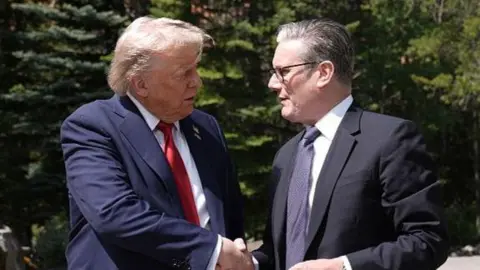Sir Keir Starmer, the Prime Minister of the United Kingdom, is poised to address the humanitarian crisis in Gaza in a meeting with US President Donald Trump in Scotland on Monday, as tensions in the region reach a critical point. The escalating violence and dire conditions in Gaza have sparked international concern, and Starmer is expected to push for urgent discussions on establishing a ceasefire to alleviate the immense suffering of the civilian population there.
Starmer’s discussions will center specifically around efforts to secure a ceasefire and negotiate a scheme for the release of hostages, a topic that saw setbacks recently when the US and Israel pulled their negotiating teams from talks held in Qatar. This development has added another layer of complexity to an already challenging diplomatic landscape. Concerns grow as humanitarian organizations warn of a looming crisis, with reports of mass starvation emerging as aid access remains restricted.
Israel recently announced the delivery of some aid supplies, claiming to have air-dropped seven packages containing essential food items such as sugar, flour, and canned goods into Gaza. However, this gesture is seen as a mere fraction of what is actually needed to combat the widespread malnutrition affecting the population. The ongoing crisis has drawn sharp critiques from various aid agencies, particularly regarding Israel’s plans to deliver supplies, emphasizing that these methods do not adequately meet the needs of the Gazan people.
In a parallel effort, the UK government is reportedly collaborating with Jordan on initiatives to send aid into Gaza. Starmer has indicated that there will be discussions held within his cabinet during the upcoming week to address this urgent matter while Parliament is in recess. These discussions come at a critical time as the situation in Gaza worsens, with ministers acknowledging the “utterly horrifying and appalling” nature of the ongoing circumstances.
James Murray, a minister in Starmer’s administration, highlighted the inhumane conditions in Gaza during an appearance on BBC Breakfast, noting that the use of starvation as a weapon of war is “completely unjustifiable.” He called for the Israeli government to ease restrictions imposed on aid deliveries, stating that air-dropped supplies alone cannot sufficiently address the crisis. Reports indicate that since the onset of violence in March, at least 127 individuals in Gaza have succumbed to malnutrition.
The blockade imposed by Israel, which halted all supplies entering Gaza, began in early March and lasted for over 11 weeks, only to see a controversial aid initiative resume later when the Gaza Humanitarian Foundation (GHF) was established with US-Israeli backing. This new system has met with criticism for effectively forcing many individuals to traverse active combat zones to reach limited aid distribution sites, resulting in significant casualties among civilians attempting to retrieve provisions.
On the diplomatic front, while Starmer engages with Trump and other European leaders—including EU chief Ursula von der Leyen—the pressure mounts domestically for the UK to formally recognize Palestine as a state. This has been highlighted by a recent commitment from French President Emmanuel Macron and a growing number of MPs expressing support for such a move.
The backdrop of these discussions is heavily shaped by Trump’s recent comments regarding Hamas’s willingness to engage in a ceasefire negotiation, coupled with the announcement from US envoy Steve Witkoff about the US’s withdrawal from ongoing talks in Doha. The US statement suggested that Hamas is not acting in good faith, which has prompted a reevaluation of strategies to address the captivity of hostages and stabilize conditions in Gaza.
As Starmer navigates this precarious diplomatic landscape, the situation remains tense and fluid, shedding light on the ongoing humanitarian crises faced by civilians in conflict zones amid international political maneuvering. The international community watches closely as these discussions unfold, aware that these decisions could have far-reaching implications for peace and stability in the region.











